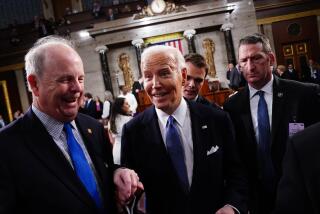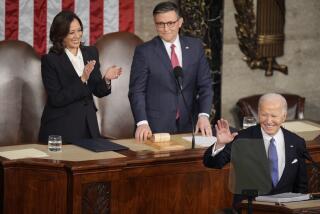Bush Seems to Hit His News Conference Stride
- Share via
WASHINGTON — President Bush might be losing his battle to overhaul Social Security, as recent polls suggest. But on Wednesday he faced the nation with the confidence and serenity of a leader who increasingly saw himself on the right side of history.
In his third news conference at the White House since the inauguration -- a departure from his first four years, when formal news conferences were relatively rare -- Bush fielded 48 minutes of questions on topics as diverse as Social Security, gasoline prices, steroids in baseball, same-sex marriage, the death penalty and the war in Iraq.
At every turn, he insisted that time would bring success.
Looking beyond immediate problems, the president suggested that -- in domestic policy, but even more in his sweeping effort to foster democracy in the Middle East -- he had launched such historic initiatives that only time could judge him.
Even George Washington’s place in history is continually reexamined, Bush said.
“People are constantly evaluating somebody’s standing in history, a president’s standing in history, based upon events that took place during the presidency, based upon things that happened after the presidency, based upon -- like in my case, hopefully, the march of freedom continues way after my presidency,” he said. “And so I just don’t worry about vindication or standing.
“The other thing, it turns out, in this job you’ve got a lot on your plate on a regular basis; you don’t have much time to sit around and wander, lonely, in the Oval Office, kind of asking different portraits, ‘How do you think my standing will be?’ ” he said.
“I’ve got a lot to do. And I like to make decisions, and I make a lot of them.”
Commenting on Bush’s buoyant performance, Whit Ayers, a Republican pollster, said, “He seems to have a real inner confidence that he is on the right side of history, and that history will judge him to be so.”
Ayers added: “He’s been through a lot, and on some of the more controversial decisions, like the decision to go into Iraq, events now make that decision look far wiser than they did at the turn of the year.”
That sentiment has been echoed in recent days by White House advisors and allies, who say Bush is ebullient.
One manifestation of this is the president’s increasing eagerness to take his ideas to the country through the give-and-take of full-scale news conferences.
Aides said Wednesday that Bush intended to continue making at least one such appearance a month. “He wants to do more press conferences,” said Scott McClellan, the White House press secretary.
Despite lagging public and congressional support for Bush’s effort to transform Social Security, White House strategists insist that is temporary. And the president’s upbeat mood Wednesday underscored that the administration claimed victories on other fronts.
In foreign policy, they include elections in Iraq, Afghanistan and the Palestinian Authority, as well as anti-Syria demonstrations in Lebanon and promises of democratic reforms in Egypt.
On the domestic front, the president has achieved such long-cherished goals as limits on class-action lawsuits, revamping of the bankruptcy system, and -- even as he faced reporters -- tentative Senate approval for oil and gas exploration of the Arctic National Wildlife Refuge in Alaska.
Bush’s apparent enjoyment of the news conference was a contrast to his first four years in office, when most of his interactions with reporters took place on the fly during short question-and-answer sessions with small groups.
An example of Bush’s previous discomfort is an April 2004 news conference, where he was asked whether he had made any mistakes after the Sept. 11 terrorist attacks. A seemingly stunned Bush replied:
“I wish you would have given me this written question ahead of time so I could plan for it.... I’m sure historians will look back and say, ‘Gosh, he could have done it better this way, or that way.’ You know, I just -- I’m sure something will pop into my head here in the midst of this press conference, with all the pressure of trying to come up with an answer, but it hadn’t yet.”
On Wednesday, Bush seemed to feel no such pressure. He answered questions affably, sometimes with self-deprecating humor.
At one point, during a discussion of Social Security, he apologized for his tendency to “blow on” about the issue.
Asked about the notion that terrorist groups such as Hezbollah might become political players in some Arab countries as part of the movement toward democracy, Bush offered a quip on a topic for which he typically reserved the gravest of tones.
“Maybe some will run for office and say, ‘Vote for me, I look forward to blowing up America.’ ” More likely, he suggested, even Palestinian candidates would campaign on local issues such as filling potholes.
Bush sounded almost professorial as he offered to “give you my talk on history and presidencies,” leading into his riff on George Washington.
The president said he recently read the Washington biography “His Excellency” by historian Joseph Ellis, and that he looked forward to a new biography coming from author David McCullough.
Bush added that, despite past claims to the contrary, he was “occasionally reading” newspaper stories about his administration -- referring to recent coverage of difficulties Iraqis were experiencing in trying to create a government.
On Social Security, Bush offered his familiar defense, waving off surveys showing that public support has slipped for his plan to let younger workers invest a portion of their payroll taxes in individual investment accounts.
“There’s all kinds of polls. For every poll you quote, I’ll quote another one,” he said. “It’s kind of the way Washington works these days. They poll everything. The one I read the other day said people like the idea of personal accounts.”
Bush said he had no problem with Congress calling on baseball players to testify about the use of steroids, and said such drug use sent “terrible signals to our youngsters.”
The president, a former Texas oilman, said he was bothered by the record rise in gasoline prices. He turned a question on the topic into another call for Congress to pass an energy bill.
On the death penalty, Bush reaffirmed his support for capital punishment despite several recent signs that his stance might be shifting, including an order that the Texas courts reassess sentences of some Mexican inmates and his State of the Union address in which he spoke of potential racial inequities in the system.
The issue is politically sensitive for Bush because it is important to the conservative Republican base that backs capital punishment and to African American pastors being courted by the White House, who have expressed concern.
“I still support the death penalty, and I think it’s a deterrent to crime,” Bush said. “But I want to make sure, obviously, that those subject to the death penalty are truly guilty.”
On another matter of interest to his GOP base, Bush reaffirmed his support for a constitutional amendment banning same-sex marriage.
He said a ruling by a San Francisco court striking California’s ban on such marriages buttressed his stance.
“No matter what your position is on the issue, this is an issue that should be decided by the people, not by judges,” he said.
More to Read
Get the L.A. Times Politics newsletter
Deeply reported insights into legislation, politics and policy from Sacramento, Washington and beyond. In your inbox twice per week.
You may occasionally receive promotional content from the Los Angeles Times.










